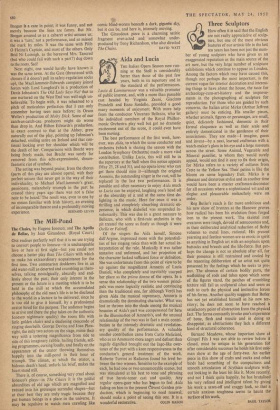Aida and Lucia
THE Italian Opera Season now run- ning at the Stoll is considerably better than those of the past few years, both in its repertory and in the standard of the performances. Lucia di Lammermoor was a valuable promoter of public interest, and, with a more than passable cast headed by Virginia Zeani, Giacinto Prandelli and Enzo Sordello, provided a good many moments of enjoyment. With more help from the conductor Vincenzo Bellezza, who let the individual members of the Royal Philhar- monic Orchestra play well but got no dramatic excitement out of the score, it could even have been moving.
The best performance of the first week, how- ever, was Aida, to which the same conductor and orchestra (which is sharing the season with the London Symphony Orchestra) made a more vital contribution. Unlike Lucia, this will still be in the repertory at the Stoll when this notice appears (May 25, 28 and 31), and no opera-lover who can get there should miss it—although the original Amneris, the outstanding singer in the cast, will be replaced in the last two performances. It is possible and often necessary to enjoy Aida much as Lucia can be enjoyed, laughing one's head off at the absurdity of it and at the same time de- lighting in the music. Here for once it was a thrilling and completely absorbing dramatic ex- perience, in which disbelief was suspended in- voluntarily. This was due in a great measure to Bellezza, who with a first-rate orchestra in the pit treated the score as finely as though it were Otello or Falstaff.
Of the singers the Aida herself, Simone dall'Argine, impressed more with the potentiali- ties of her ringing voice than with her actual in- terpretation of the role. Musically it was rather tentative and unformed, and her projection of the character lacked sufficient force or definition. She was unfortunate from this point of view to be up against the magnificent Amneris of Lucia Danieli, who completely and inevitably usurped her place as the prima donna of the opera. In a sense this relationship of the two women princi- pals was more logically realistic and convincing than the traditional one, for although Verdi has given Aida the musical supremacy, Amneris is dramatically the dominating character. What was lost or thrown into the shade among the musical beauties of Aida's part was compensated for here in the illumination of Amneris's, and the unusual relationship of the two was in fact a main contri- bution to the intensely dramatic and revelation- ary quality of the performance. A valuable smaller contribution came from Carlo Meliciani, who as an Amonasro more angry and defiant than regally dignified brought out the Iago-like over- tones of the part with a keen responsiveness to the conductor's general treatment of the work. Roberto Turrini as Radames found his level be- tween the two women. Sensitive to the example of each, he had one or two unmemorable scenes, but was stimulated at his best to tone and phrasing of true heroic-tenor cast and quality. Any regular opera-goer who has begun to feel Aida fading on him in the present Covent Garden pro- duction, which is beginning to need renewal, should make a point of seeing this one. It is a






























 Previous page
Previous page